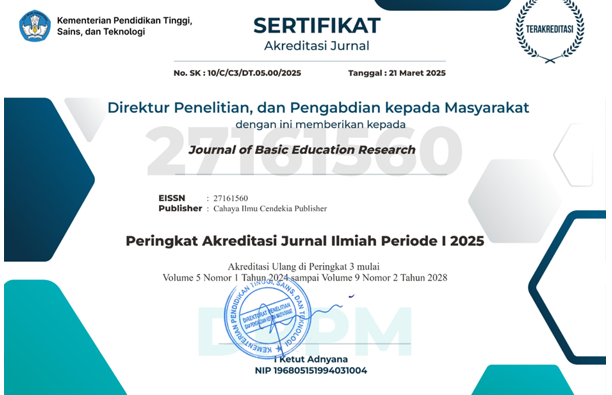Implementation School Based Local Wisdom in the Learning Process in Elementary Schools
Abstract
Purpose of the Study: This research aims to explore the understanding of school leaders, development teams, and teachers regarding the concept of school-based local wisdom.
Methodology: This study employs a descriptive qualitative approach. The subjects include the school principal, development team, teachers, and students. Data was collected through observations, interviews, and documentation, with data analyzed using reduction, display, and conclusion-drawing techniques. The validity of the data was ensured using triangulation of techniques and sources.
Main Findings: The research findings reveal a shared understanding among the school principal, development team, and teachers regarding integrating local wisdom into school-based education. The principal views school-based local wisdom as incorporating cultural elements into the learning environment. The development team interprets it as applying local cultural practices within the curriculum, while teachers link the learning process to local wisdom in the community. At Sendangsari Elementary School, local wisdom such as traditional foods, karawitan (Javanese music), dance, and batik are actively developed. The school employs five key strategies: forming collaborative teams, preparing supporting facilities, implementing strategic plans, partnering with external parties, and fostering community collaboration.
Novelty/Originality of this Study: This research offers new insights into integrating local wisdom into curricular and extracurricular activities at the primary school level. It highlights the types of local wisdom developed and presents a model for schools to collaborate with communities and external stakeholders, contributing to the academic discourse on culturally responsive education.
References
A. Asnati, H. Somantik, and M. Mau, “Pentingnya guru pendidikan agama kristen dalam memberikan pendidikan seks kepada peserta didik di SMAS Rentawan Jelimpo [The importance of Christian religious education teachers in providing sex education to students at SMAS Rentawan Jelimpo],” Jurnal Riset Rumpun Ilmu Bahasa, vol. 3, no. 1, pp. 67-79, 2024, doi: 10.55606/jurribah.v3i1.2777.
M. B. Sakti, M. M. Adha, and E. Siswanto, “Implementasi pendidikan berbasis multikultural sebagai upaya penguatan nilai karakter toleransi dan cinta damai [Implementation of multicultural-based education as an effort to strengthen the character values of tolerance and love of peace],” Jurnal Kultur Demokrasi, vol. 12, no. 1, 2023.
I. D. Mawardini, “Integrasi pendidikan karakter mata pelajaran IPS di MI terhadap nilai-nilai Islam [Integration of character education in social studies subjects in MI with Islamic values],” Islamic Elementary School (IES), vol. 2, no. 2, pp. 270-283, 2022, doi: 10.55380/ies.v2i2.368.
H. Simanjuntak, K. M. D. Pasaribu, and N. C. Sitanggang, “Pengaruh sarana prasarana dan lingkungan sekolah terhadap hasilbelajar siswa pada mata pelajaran pendidikan kewarganegaraan di smp swasta karya Bhakti Medan tahun pelajaran 2022/2023 [The influence of school infrastructure and environment on student learning outcomes in civic education subjects at Karya Bhakti Medan Private Middle School in the 2022/2023 academic year],” JIM: Jurnal Ilmiah Mahasiswa Pendidikan Sejarah, vol. 8, no. 2, pp. 628-633, 2023, doi: 10.24815/jimps.v8i2.24752.
A. B. Muslim, “Character education curriculum in the government of indonesia strengthening character education program,” JIEBAR: Journal of Islamic Education: Basic and Applied Research, vol. 1, no. 2, pp. 137-153, 2020, doi: 10.33853/jiebar.v1i1.101.
D. Prasetyo, J. Danurahman, and H. Hermawan, “Implementasi pendidikan kewarganegaraan dalam mewujudkan warga negara baik dan cerdas [Implementation of civic education in creating good and intelligent citizens],” Harmony: Jurnal Pembelajaran IPS dan PKN, vol. 8, no. 1, pp. 15-23, 2023, doi: 10.15294/harmony.v8i1.52768.
S. P. Fauziah, “Penguatan pendidikan karakter melalui budaya sekolah [Strengthening character education through school culture],” Tadbir Muwahhid, vol. 5, no. 1, 2021, doi: 10.30997/jtm.v5i1.3512.
R. Megawati and T. Ningsih, “Pembentukan karakter melalui pembelajaran ilmu pengetahuan sosial (IPS) [Character formation through social science (IPS) learning],” Jurnal Kependidikan, vol. 8, no. 2, pp. 249-263, 2020, doi: 10.24090/jk.v8i2.5580.
L. Asyari, D. Gunawan, R. K. Adiredja, and M. Ramdan, “Sosialisasi pendidikan berbasis kearifan lokal kepada masyarakat Desa Girimakmur Kecamatan Malangbong [Socialization of local wisdom-based education to the community of Girimakmur Village, Malangbong District],” Badranaya: Jurnal Pengabdian kepada Masyarakat, vol. 1, no. 02, pp. 34-38, 2023, doi: 10.31980/badranaya.v1i02.712.
M. Rummar, “Kearifan lokal dan penerapannya di sekolah [Local wisdom and its application in schools],” Jurnal Syntax Transformation, vol. 3, no. 12, pp. 1580-1588, 2022, doi: 10.46799/jst.v3i12.655.
A. R. Dhoni, S. Syahrial, and S. Noviyanti, “Melestarikan kearifan lokal dalam pembelajaran SBdP di Kelas V di SDN 55/I Sridadi [Preserving local wisdom in SBdP learning in Class V at SDN 55/I Sridadi],” Jurnal Pendidikan dan Konseling (JPDK), vol. 4, no. 3, pp. 488-491, 2022, doi: 10.31004/jpdk.v4i3.4363.
N. F. Gebze, D. Harmawati, and H. Fitrianti, “Upaya meningkatkan kreativitas anak melalui kegiatan mewarnai berbasis kearifan lokal Papua di TK Melati sanggar kegiatan belajar Merauke [Efforts to increase children's creativity through coloring activities based on local Papuan wisdom at Melati Kindergarten, Merauke learning activity studio],” Ta'rim: Jurnal Pendidikan dan Anak Usia Dini, vol. 4, no. 2, pp. 178-186, 2023, doi: 10.59059/tarim.v4i2.191.
D. S. Putri, S. D. Ardianti, and L. Kironoratri, “Pengaruh mobelik berbasis keunggulan lokal jenang kudus terhadap pemahaman konsep pada siswa kelas IV Sekolah Dasar 03 Karangmalang [The influence of local excellence-based mobile jenang kudus on conceptual understanding in grade IV students of Elementary School 03 Karangmalang],” Pendas: Jurnal Ilmiah Pendidikan Dasar, vol. 8, no. 2, pp. 4670-4680, 2023, doi: 10.23969/jp.v8i2.9205.
N. Noviyanti, S. Ahmad, and P. Padilah, “Pengembangan buku lembar kerja anak berbasis kearifan lokal Sumatera Selatan di PAUD Arrayyan Palembang tahun pelajaran 2021/2022 [Development of children's worksheet books based on local wisdom of South Sumatra at PAUD Arrayyan Palembang in the 2021/2022 academic year],” Jurnal Lentera Pedagogi, vol. 7, no. 1, pp. 1-9, 2023, doi: 10.54895/lentera.v7i1.2061.
S. A. K. Ningrum, E. Supriatin, and A. Karwati, “Pentingnya pendidikan anak usia dini bagi tumbuh kembang anak [The importance of early childhood education for child development],” RECQA: Research Early Childhood Qurrota A'yun, vol. 1, no. 1, pp. 41-53, 2024.
A. Meiranti and W. Sugandi, “Mengkaji makna yang terkandung dalam puisi 'di lereng gunung' karya je tatengkeng dengan pendekatan semiotika [Examining the meaning contained in the poem 'On the Slopes of the Mountain' by JE Tatengkeng using a semiotic approach.],” Inspirasi Dunia: Jurnal Riset Pendidikan dan Bahasa, vol. 1, no. 4, pp. 82-89, 2022, doi: 10.58192/insdun.v1i4.228.
L. D. Putra, A. A. P. Sugiarto, S. Aisyah, L. R. Novianti, and C. H. Setiawan, “Analisis media pembelajaran lingkaran hari dalam meningkatkan minat belajar anak berkebutuhan khusus di SLB Negeri 2 Bantul [Analysis of the circle of days learning media in increasing the learning interest of children with special needs at SLB Negeri 2 Bantul],” Journal on Education, vol. 6, no. 3, pp. 18002-18009, 2024, doi: 10.31004/joe.v6i3.5158.
T. Rahmawati, D. Lyesmaya, and D. A. Uswatun, “Analisis pembelajaran dengan menggunakan modul pilar karakter percaya diri di SDS Darul ‘Amal Jampangkulon [Analysis of learning using the self-confidence character pillar module at SDS Darul ‘Amal Jampangkulon],” COLLASE (Creative of Learning Students Elementary Education), vol. 7, no. 2, pp. 206-213, 2024, doi: 10.22460/collase.v7i2.22547.
O. B. W. Selan, V. Wangge, and T. Ajito, “Kajian nilai budaya ‘Etu’ dan integrasinya dengan pendidikan jasmani adaptif pada anak berkebutuhan khusus di Kabupaten Nagekeo NTT [Study of the cultural values of ‘Etu’ and its integration with adaptive physical education for children with special needs in Nagekeo Regency, NTT],” Journal on Education, vol. 6, no. 1, pp. 8790-8794, 2023, doi: 10.31004/joe.v6i1.4361.
S. N. Azminah, A. Citrasukmawati, and S. Idamulyani, “Penerapan pembelajaran sains dalam menstimulasi perkembangan anak pada masa pembelajaran tatap muka terbatas (PTMT) di KB Bintang Kejora [Implementation of science learning in stimulating child development during the limited face-to-face learning period (PTMT) at KB Bintang Kejora],” Jambura Early Childhood Education Journal, vol. 4, no. 1, pp. 44-52, 2022, doi: 10.37411/jecej.v4i1.1062.
Z. K. Prasetyo, “Pembelajaran sains berbasis kearifan lokal [Local wisdom-based science learning],” Prosidind, Seminar Nasional Fisika dan Pendidikan Fisika, Surakarta, FKIP UNS, 2013.
S. Bahri, M. Ramly, and A. Gani, “Organizational commitment and civil servants performance: The contribution of intelligence, local wisdom and organizational culture,” European Journal of Business and Management Research, vol.. 6, no. 1, pp. 128-134, 2021, doi: 10.24018/ejbmr.2021.6.1.720.
J. Syahfitri, “The utilization of local wisdom-based interactive digital module to improve students’ critical thinking skills,” International Journal of STEM Education for Sustainability, vol. 3, no. 1, pp. 110-119, 2024, doi: 10.53889/ijses.v4i1.305.
J. Ma’mur, Pendidikan berbasis keunggulan lokal [Education based on local excellence], Yogyakarta: DIVA Press, 2012.
M. S. Ramírez-Montoya, L. Andrade-Vargas, D. Rivera-Rogel, and M. Portuguez-Castro, “Trends for the future of education programs for professional development,” Sustainability, vol. 13, no. 13, pp. 7244, 2021, doi: 10.3390/su13137244.
A. Hermino, and I. Arifin, “Contextual character education for students in the senior high school,” European Journal of Educational Research, vol. 9, no. 3, pp. 1009-1023, 2020, doi: 10.12973/eu-jer.9.3.1009.
P. Glavič, “Identifying key issues of education for sustainable development,” Sustainability, vol. 12, no. 16, pp. 6500, 2020, doi: 10.3390/su12166500.
H. G. Bilgiç, and H. Tuzun, “Issues and challenges with web-based distance education programs in Turkish higher education institutes,” Turkish Online Journal of Distance Education, vol. 21, no. 1, pp. 143-164, 2020, doi: 10.17718/tojde.690385.
Y. Yan, and K. Saguin, “Policy capacity matters for capacity development: Comparing teacher in-service training and career advancement in basic education systems of India and China,” International Review of Administrative Sciences, vol. 87, no. 2, pp. 294-310, 2021, doi: 10.1177/0020852320983867.
A. Van den Beemt, M. MacLeod, J. Van der Veen, A. Van de Ven, S. Van Baalen, R. Klaassen, and M. Boon, “Interdisciplinary engineering education: A review of vision, teaching, and support,” Journal of engineering education, vol. 109, no. 3, pp. 508-555, 2020, doi: 10.1002/jee.20347.
Copyright (c) 2024 Agung Wahyudi, Bash Asbe Edward

This work is licensed under a Creative Commons Attribution 4.0 International License.
Authors who publish with this journal agree to the following terms:
- Authors retain copyright and acknowledge that the Journal of Basic Education Research is the first publisher licensed under a Creative Commons Attribution 4.0 International License.
- Authors are able to enter into separate, additional contractual arrangements for the non-exclusive distribution of the journal's published version of the work (e.g., post it to an institutional repository or publish it in a book), with an acknowledgment of its initial publication in this journal.
- Authors are permitted and encouraged to post their work online (e.g., in institutional repositories or on their website) prior to and during the submission process, as it can lead to productive exchanges and earlier and greater citation of published work.





.png)


.png)
.png)


















